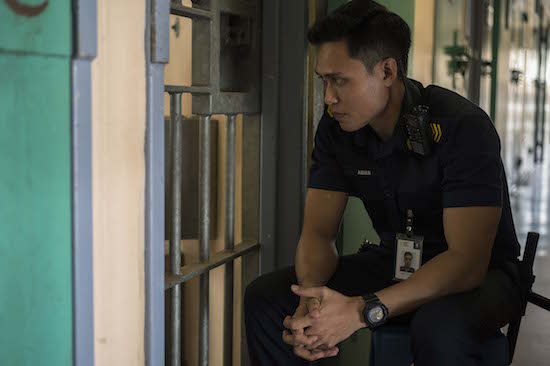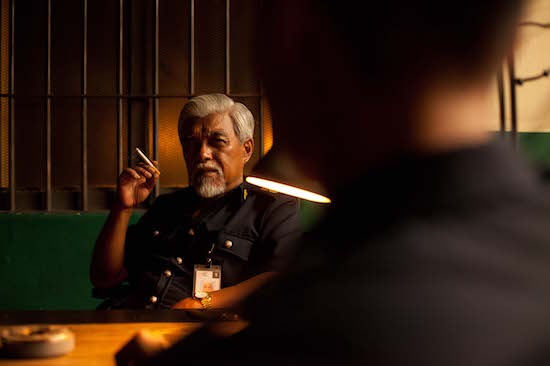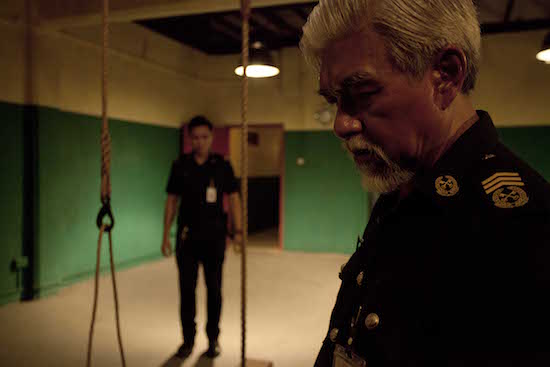A Different Angle on Death Row
Written and directed by Boo Junfeng (2010’s Sandcastle), Apprentice is a quiet yet gritty drama about a newly hired young prison guard who is “promoted” to working on death row. (It was Singapore’s official entry for the 2017 Best Foreign Language Film Oscar.) Unlike other movies of its genre, Apprentice doesn’t go for big, sweeping statements or emotions, but instead shows one man struggling with a soul-wrenching job as he comes to terms with his own family’s past.
We first meet Aiman (newcomer Fir Rahman) as he’s being interviewed for a position as a guard in a maximum security prison. His stated reason for being there is idealistic: he wants to help people change. Initially, pending a background check, he has limited security clearance, i.e. no access to the “condemned cells.” Scenes of him joking around with prisoners in the yard and helping them with shop equipment indicate that he truly does want to help. He glimpses an older, white-haired man in the cafeteria and there is a wary recognition. This is Chief Rahim (played by the excellent Wan Hanafi Su).
Later, when helping another guard move equipment in the condemned block, Aiman brings himself to the attention of Rahim by volunteering information about where to get a certain type of rope. As the camera casually hovers over an open trap door, we realize that this is where hangings take place. The no-nonsense tone and mundane conversation illustrate the businesslike nature of death here.
Scenes at the prison alternate with scenes of Aiman’s rundown apartment, which he shares with his older sister. They don’t have a lot of money and she doesn’t like him working at the prison. When Aiman tells her that he’s met “the hangman,” we find out that Rahim executed their father years ago, when Aiman was a baby.
The chief takes a shine to Aiman and later seeks him out to help fix the scale used to weigh condemned prisoners in order to calculate a quick death. They exchange personal information, including the fact that Aiman had once been a rebellious gang member. He asks pointed questions about the prisoners that Rahim has executed and and later tries to find his father’s files.
When Aiman’s supervisor asks about his family, we learn he was raised by grandparents. He is clearly both haunted by his father’s memory and afraid of being discovered as his son; why exactly does his want to work at the prison? His sister, who is planning to marry her boyfriend and move to Australia, wants Aiman to go with them. Meanwhile Chief Rahim asks Aiman to “learn the ropes” and be his assistant. “We are humane,” he reiterates while instructing Aiman in the specific science of hanging, which is shown very matter of factly, all the more chilling.
As more details unspool about Aiman’s father and his legacy, we see the rituals surrounding hanging and the toll that it takes on both its perpetrators and prisoners’ families. (Capital punishment in Singapore has not traditionally been reserved for murderers only.) The film becomes increasingly more disturbing as we follow one inmate through the steps leading to his death and aftermath. The conflicted Aiman eventually erupts into an emotional confrontation with the chief, with dramatic results.
Apprentice is an unusual look into the specifics of capital punishment and death by hanging, as well as a drama about a man who is driven by his own demons to work in such a place. One of the film’s assets is the compassionate way it deals with both the doomed prisoners and guards who grapple with the emotional toil of their jobs. Junfeng has created a quietly powerful film that makes its point without fanfare and is all the stronger for it.
Apprentice opens on Friday, March 3, at Village East Cinema.
—Marina Zogbi




